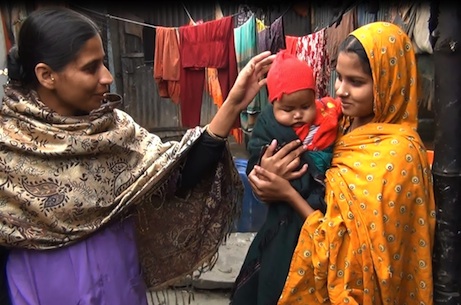
A fingerprint identification system developed by Gates Cambridge Scholars and others has been awarded US$250,000 after winning a highly competitive seed grant from the Saving Lives at Birth competition.
University of Cambridge students who are piloting a fingerprint identification system for applications in global health, microfinance and fighting corruption have been awarded US$250,000 after winning a highly competitive seed grant from the Bill and Melinda Gates Foundation’s Saving Lives at Birth competition.
The grant will be partially matched (to the tune of US$180,000) by Cambridge-based ARM Ltd, whose technology is incorporated in over 95% of all the world’s mobile phones.
SimPrints was one of 30 winners of the Grand Challenge competition at the annual Saving Lives at Birth DevelopmentXChange announced on Friday. The Challenge was a global call for groundbreaking, scalable solutions to infant and maternal mortality around the time of birth. In partnership with the Johns Hopkins University Global mHealth Initiative (GmI), which works to improve global health by advancing the use of innovative mobile digital technologies, and with BRAC, the world’s largest NGO, SimPrints will use Saving Lives at Birth and ARM funding to optimise their system and conduct a pilot study in Bangladesh. This study will assess the ability of SimPrints to improve healthcare for women and their children.
The Saving Lives at Birth partnership, launched in 2011, includes the US Agency for International Development (USAID), the Government of Norway, the Bill & Melinda Gates Foundation, Grand Challenges Canada (funded by the Government of Canada), and the UK’s Department for International Development (DFID). At the DevelopmentXChange nominees showcased innovative ideas to save the lives of mothers and newborns in developing countries and competed for funding to realise and scale their vision.
Cambridge students, including Gates Cambridge Scholars and a colleague from the Royal Holloway, developed SimPrints with support from Makespace community workshop. In May they field-tested their prototype at Johns Hopkins University – JiVitA and BRAC field sites in Bangladesh. There, they also found their first client, the social enterprise mPower, who are currently integrating SimPrints into a rural healthcare initiative.
The portable Bluetooth-enabled fingerprint scanner will be carried by health workers to instantly connect an individual’s fingerprint to their medical record, which is brought up onto the health worker’s mobile. Other Johns Hopkins projects, including a collaboration with the Government of Bangladesh Ministry of Health and Family Welfare to improve vaccination systems nationally, will be exploring the integration of SimPrints into their system. Dr Alain Labrique, Director of the JHU Global mHealth Initiative, expressed his enthusiasm for the collaboration saying: “This is a very exciting initial investment into a promising technology that addresses a key bottleneck in global health programmes. As we struggle to identify ways to strengthen vital registration systems that improve our ability to deliver care to every person who needs it – knowing who someone is and being able to pull up their prior health record is a real game changer for the footsoldiers of global health.”
Every year at least 340,000 women die in pregnancy and child birth. Antenatal visits by health workers, who are the main point of healthcare for many millions in developing countries, can identify the warning signs of dangerous pregnancies yet all too often mothers are lost to follow-up – over 62% according to the WHO – leading to hundreds of thousands of preventable deaths every year. In large part this is because patient identification and tracking remain extremely difficult, especially with poor, remote populations who often have no formal identification number or system. To solve this, SimPrints has developed a low-cost, highly accurate mobile fingerprint scanner for low-resource settings, enabling a multitude of community health worker programmes to leverage the power of biometric identity to strengthen service delivery in even the most remote parts of the globe.
The system will be able to seamlessly integrate with many pre-existing development tools to allow them to overcome identification challenges. SimPrints sees potential for the technology in many other development initiatives, such as in improving drug adherence, microfinance, and fighting corruption. Co-founder and Gates Cambridge Scholar Daniel Storisteanu [2012] says: “This funding is a huge opportunity for us to attract talent and accelerate our development, so that we can build and optimise every technical aspect of this system to address global health challenges.”
Photo supplied by SimPrints.












